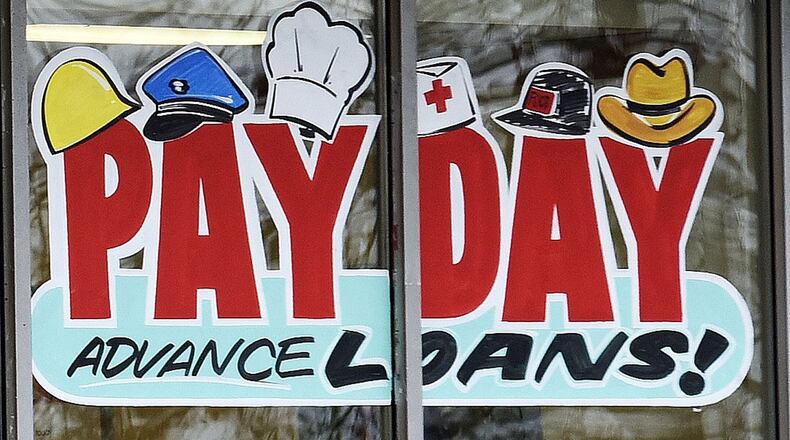RELATED: Kasich signs payday lending reforms into law
State Rep. Kyle Koehler, R-Springfield, a co-sponsor of and a driving force behind the bill, said getting the law passed was a long but worthy road.
“It has been a lot of hard work,” Koehler said. “This was not an easy bill and we knew that from the very beginning but it was an important bill and it is going to help people for many years.”
The new law will cap interest rates at 28 percent annual interest and a maximum monthly fee of 10 percent capped at $30; close loopholes that allowed companies to issue loans through other sections of state law; limit monthly repayments on short-term loans to no more than 6 percent of the borrower’s gross monthly income.
Advocates for the changes say it’ll save Ohioans more than $75 million a year in excessive fees.
There are 13 such stores in Springfield and Urbana, many clustered on East Main and South Limestone streets. Ohio in all has more than 830 storefronts that offer payday or car title loans, most of which offer both forms of loans, according to a report by the Center for Responsible Lending.
Koehler said the goal has never been to eliminate the payday lending industry in the state, but to regulate it.
Lenders will have about 180 days to relicense themselves and to follow the new law, Koehler said.
Community leader and local pastor Carl Ruby was one of those advocates and said the bill is a big change for the state.
“I think Ohio went from being one of the least regulated and state where there is the most abuse to the state with one of the very best laws,” Ruby said. “I think that is a huge accomplishment.”
PREVIOUS: Payday lending reform one step closer in Ohio
Ruby and Koehler said the bill started when a group of pastors and Chamber of Greater Springfield President Mike McDorman met with local representatives at Young’s Jersey Dairy. They discussed the issues there.
Ruby has been a part of a state-wide group working to put a petition on November’s ballot to regulate the payday industry. He said that the group will no longer seek the ballot question.
The bill faced a huge battle in the General Assembly and is linked to the sudden resignation of former House speaker Cliff Rosenberger. The Clarksville Republican stepped down in April after acknowledging he was under federal investigation. The FBI, which is looking at Rosenberger’s international travel with payday lenders, raided his home and storage unit in May.
House Bill 123 was among nine bills signed into law by Kasich on Monday without a public ceremony. Kasich said a day before signing the bill that he thought it was an important step to protect Ohioans.
MORE: Springfield pastor wants to takes payday loan fight to ballot
“We are excited that we finally brought real payday lending reform to the state of Ohio after 10 long years of unlicensed payday lenders operating through the loophole and taking advantage of borrowers in Ohio,” Koehler said
Continuing Coverage:
The Springfield News-Sun has covered the payday lending bill from the beginning. The paper has provided continued updates throughout the legislation process.
About the Author
